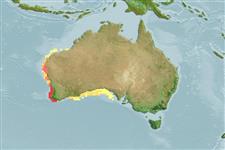Environment: milieu / climate zone / depth range / distribution range
ນິເວດວິທະຍາ
ສັດທະເລ ກ່ຽວກັນຫີນ; ລະດັບຄວາມເລິກ 10 - 60 m (Ref. 57886). Subtropical
ການແຜ່ກະຈາຍ
ປະເທດ | ເຂດ FAO | ລະບົບນິເວດ | ການປະກົດຕົວ | Point map | ການແນະນຳ | Faunafri
Eastern Indian Ocean: Western Australia.
ຂະໜາດ / ນ້ຳໜັກ / Age
Maturity: Lm ? range ? - ? cm
Max length : 10.2 cm SL ຕົວຜູ້/ບໍ່ມີເພດ; (Ref. 57886); 11.8 cm SL (female)
Short description
ສະລີລະວິທະຍາ | ການວັດແທກຮູບຮ່າງລັກສະນະພາຍນອກຂອງດິນ,ສັດ,ປາ…
ຄີຫຼັງຂອງປາ (ຄີອ່ອນ) (ທັງໝົດ): 104-110; ຄີກົ້ນຂອງປາ: 66 - 73; ສັດທີ່ມີກະດູກສັນຫຼັງ: 53 - 56. The species is characterized by having a very elongate body; vertebrae 16-17 + 36-40 = 53-56, dorsal fin rays 104-110, anal fin rays 66-73, D/A 41-43, V/A 19-20; scales present on body; no supraorbital pore behind eye; lower preopercular pores 3, non-tubular; posterior infraorbital pores 3; broad angle on ventral maxilla positioned behind rear of eye; exposed opercular
spine bent upwards; lower lip with skin folds; single pair of pseudoclaspers curved, hockey stick-like, thin; penis slightly shorter than pseudoclaspers, with hook at tip; otoliths pointed anteriorly and posteriorly, their predorsal and postdorsal angles are similar in expression, otolith length to height ratio 2.1-2.2, with sulcus narrow (Ref. 57886).
Life cycle and mating behavior
ການຈະເລີນເຕັມໄວ | ການສືບພັນ | ການວາງໄຂ່ | ໄຂ່ | ຄວາມດົກຂອງໄຂ່ປາ | ຕົວອ່ອນ
Møller, P.R. and W. Schwarzhans, 2006. Review of the Dinematichthyini (Teleostei, Bythitidae) of the Indo-west Pacific, Part II. Dermatopsis, Dermatopsoides and Dipulus with description of six new species. The Beagle 22:39-76. (Ref. 57886)
IUCN Red List Status (Ref. 130435)
Threat to humans
Harmless
Human uses
ຂໍ້ມູນຕື່ມອີກ
ປະເທດເຂດ FAOລະບົບນິເວດການປະກົດຕົວການແນະນຳStocksນິເວດວິທະຍາອາຫານລາຍການອາຫານການບໍລິໂພກອາຫານອັດຕາ
ຊື່ສາມັນຄຳສັບຄ້າຍຄືກັນການເຜົາໃໝ້ພະລັງງານໂດຍປ່ຽນທາດອາຫານໃນຮ່າງກາຍໃຫ້ກາຍເປັນຊີ້ນແລະໜັງຜູ້ລ້າການສຶກສາຜົນກະທົບຂອງສານຜິດທີ່ມີຜົນກະທົບຕໍ່ລະບົບນິເວດການສືບພັນການຈະເລີນເຕັມໄວການວາງໄຂ່ການສັງລວມການວາງໄຂ່ຄວາມດົກຂອງໄຂ່ປາໄຂ່Egg development
Age/Sizeການເຕີບໃຫຍ່Length-weightLength-lengthLength-frequenciesການວັດແທກຮູບຮ່າງລັກສະນະພາຍນອກຂອງດິນ,ສັດ,ປາ…ສະລີລະວິທະຍາຕົວອ່ອນການປ່ຽນແປງຂອງຕົວອ່ອນການທົດແທນທີ່ຄວາມອຸດົມສົມບູນBRUVS
ເອກະສານອ້າງອີງການລ້ຽງສັດນ້ຳຂໍ້ມູນການລ້ຽງສັດນ້ຳສາຍພັນກຳມະພັນElectrophoresesການຖ່າຍທອດທາງກຳມະພັນຈາກພໍ່ແມ່ຫາລູກພະຍາດການປຸງແຕ່ງNutrientsMass conversion
ຜູ້ຮ່ວມມືຮູບStamps, Coins Misc.ສຽງຫອຍມີພິດຊະນິດນຶ່ງທີ່ອາໄສໃນທະເລຄວາມໄວປະເພດການລອຍເນື້ອທີ່ເຫືອກOtolithsສະໝອງວິໄສທັດ
ເຄື່ອງມື
Special reports
Download XML
ແຫຼ່ງອີນເຕີເນັດ
Estimates based on models
Preferred temperature (Ref.
123201): 16.8 - 22.6, mean 18 °C (based on 44 cells).
Phylogenetic diversity index (Ref.
82804): PD
50 = 0.6250 [Uniqueness, from 0.5 = low to 2.0 = high].
Bayesian length-weight: a=0.00389 (0.00180 - 0.00842), b=3.12 (2.94 - 3.30), in cm total length, based on all LWR estimates for this body shape (Ref.
93245).
ຊັ້ນເຂດຮ້ອນ (Ref.
69278): 3.4 ±0.5 se; based on size and trophs of closest relatives
Fishing Vulnerability (Ref.
59153): Low vulnerability (10 of 100).
